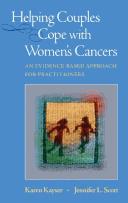| Listing 1 - 4 of 4 |
Sort by
|

ISBN: 0387748032 0387748024 1441945148 Year: 2008 Publisher: New York, NY : Springer US : Imprint: Springer,
Abstract | Keywords | Export | Availability | Bookmark
 Loading...
Loading...Choose an application
- Reference Manager
- EndNote
- RefWorks (Direct export to RefWorks)
Close relationships can be vital to a woman’s recovery from breast or gynecological cancer and the myriad stressors that accompany diagnosis and treatment. Helping Couples Cope with Women’s Cancer shows readers not only how to enlist the patient’s closest support person in coping with the disease, but also to help that partner with the stressors, such as feelings of inadequacy and loss, that so often come with the role. The authors, established experts on their subject, recognize the challenges couples face, the central role of communication in coping, and the individuality of each patient and couple. In addition to proven intervention techniques and helpful assessment tools, the book features case illustrations, "What to do if…" sections, sociocultural considerations, and suggestions for when the patient’s caregiver is not her partner. Key areas of coverage include: Assessment: quality of life, impact of illness, family resources. Balancing work, family, self-care, and the demands of illness. Cognitive coping, relaxation, stress reduction. Body image, sexuality, and intimacy. Helping children cope: developmental guidelines. Transitions: goal-setting, life after cancer, facing recurrence or terminal illness. The skills and insights contained in Helping Couples Cope with Women’s Cancers will benefit a range of health and mental health practitioners, including counselors, social workers, clinical psychologists, psychiatrists, and nurses. Graduate students planning a career in health psychology or couples therapy should also find it a valuable resource.
Cancer --- Couples therapy. --- Generative organs --- Sex factors. --- Cancer. --- Couples psychotherapy --- Unmarried couples therapy --- Group psychotherapy --- Marital psychotherapy --- Sex differences --- Consciousness. --- Oncology . --- Psychology. --- Psychology, clinical. --- Social work. --- Applied psychology. --- Personality and Social Psychology. --- Oncology. --- Popular Science in Psychology. --- Clinical Psychology. --- Social Work. --- Psychotherapy and Counseling. --- Clinical psychology. --- Applied psychology --- Psychagogy --- Psychology, Practical --- Social psychotechnics --- Psychology --- Benevolent institutions --- Philanthropy --- Relief stations (for the poor) --- Social service agencies --- Social welfare --- Social work --- Human services --- Behavioral sciences --- Mental philosophy --- Mind --- Science, Mental --- Human biology --- Philosophy --- Soul --- Mental health --- Tumors --- Apperception --- Mind and body --- Perception --- Spirit --- Self --- Psychiatry --- Psychology, Applied --- Psychological tests --- Generative organs, Female --- Breast --- Psychological aspects. --- Patients --- Family relationships. --- Counseling of. --- Personality. --- Social psychology. --- Psychotherapy. --- Counseling. --- Mass psychology --- Psychology, Social --- Human ecology --- Social groups --- Sociology --- Personal identity --- Personality psychology --- Personality theory --- Personality traits --- Personology --- Traits, Personality --- Individuality --- Persons --- Temperament --- Therapy (Psychotherapy) --- Mental illness --- Clinical sociology --- Mental health counseling --- Counselling --- Helping behavior --- Interviewing --- Personal coaching --- Social case work --- Treatment

ISBN: 9780387748030 Year: 2008 Publisher: Boston, MA Springer Science+Business Media, LLC
Abstract | Keywords | Export | Availability | Bookmark
 Loading...
Loading...Choose an application
- Reference Manager
- EndNote
- RefWorks (Direct export to RefWorks)
Psychiatry --- evidence-based methodiek --- klinische psychologie
Book
Abstract | Keywords | Export | Availability | Bookmark
 Loading...
Loading...Choose an application
- Reference Manager
- EndNote
- RefWorks (Direct export to RefWorks)

ISBN: 9780387748030 Year: 2008 Publisher: Boston MA Springer US
Abstract | Keywords | Export | Availability | Bookmark
 Loading...
Loading...Choose an application
- Reference Manager
- EndNote
- RefWorks (Direct export to RefWorks)
Close relationships can be vital to a woman's recovery from breast or gynecological cancer and the myriad stressors that accompany diagnosis and treatment. Helping Couples Cope with Women's Cancer shows readers not only how to enlist the patient's closest support person in coping with the disease, but also to help that partner with the stressors, such as feelings of inadequacy and loss, that so often come with the role. The authors, established experts on their subject, recognize the challenges couples face, the central role of communication in coping, and the individuality of each patient and couple. In addition to proven intervention techniques and helpful assessment tools, the book features case illustrations, "What to do if ¦" sections, sociocultural considerations, and suggestions for when the patient's caregiver is not her partner. Key areas of coverage include: Assessment: quality of life, impact of illness, family resources. Balancing work, family, self-care, and the demands of illness. Cognitive coping, relaxation, stress reduction. Body image, sexuality, and intimacy. Helping children cope: developmental guidelines. Transitions: goal-setting, life after cancer, facing recurrence or terminal illness. The skills and insights contained in Helping Couples Cope with Women's Cancers will benefit a range of health and mental health practitioners, including counselors, social workers, clinical psychologists, psychiatrists, and nurses. Graduate students planning a career in health psychology or couples therapy should also find it a valuable resource.
Psychiatry --- evidence-based methodiek --- klinische psychologie
| Listing 1 - 4 of 4 |
Sort by
|

 Search
Search Feedback
Feedback About UniCat
About UniCat  Help
Help News
News